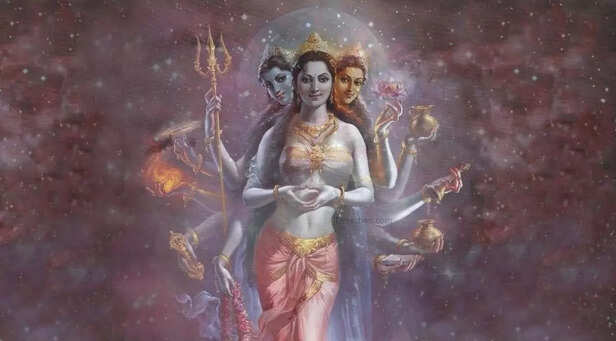Why Women Are Rejecting Marriage & Motherhood—The Truth Through Tantra’s Lens
Ankit Gupta | Apr 29, 2025, 23:28 IST
In Tantra, the feminine is not merely a passive receiver but an active, creative force, a dynamic energy that holds the power to manifest and create life itself. This is why women, in their full Shakti, cannot conform to systems that do not honor their essence. The idea that a woman’s womb is a space for creation and her heart a vessel of devotion is central to understanding why many women are choosing not to participate in conventional roles that society often expects them to occupy.
"Yatra naryastu pujyante ramante tatra Devataḥ – Where women are worshipped, there the gods dwell."
— Manusmriti
There is a shift happening across the world, subtle yet seismic. A quiet revolution in the hearts of women, echoing across cultures and continents. It’s not a rebellion in the streets—it’s a revolution in the womb. Women are walking away. Not from love, not from family, but from a system that has long failed to honor their essence. Many are rejecting marriage. Many are choosing not to become mothers. And this choice, misunderstood by some as selfish or unnatural, is in fact deeply spiritual. Through the lens of Tantra—a philosophy that venerates the feminine as divine—we can begin to understand the deeper truth behind this mass turning away.
This is not rebellion. This is remembrance. This is Shakti reclaiming herself.

In Tantra, the feminine is not an afterthought. She is not the support. She is the Source.
Shakti, the primordial energy, is the force behind all creation. Without her, even Shiva—the god of stillness and awareness—is inert. Shakti dances, and the cosmos moves. She is not just a mother, not just a lover, not just a nurturer. She is the fire, the water, the womb, the storm. The woman, in her fullness, is the embodiment of this divine force. Her womb is not just a biological organ—it is a portal. Her heart is not just an emotional center—it is the seat of devotion that can birth galaxies.
In Tantric cosmology, to approach a woman is to approach the goddess. This is not metaphorical; this is literal. The ancient practices of Tantra demanded that a man bow to the Shakti in his partner before union—because union without reverence is desecration.
This reverence has disappeared.

There was a time when marriage was a sacred sacrament, not a social contract. In the Vedic and Tantric traditions, marriage was a union of energies—a balancing of masculine and feminine polarities, a ritual of honoring, not ownership.
But over centuries, marriage changed. It became institutionalized, legalistic, patriarchal. It became about lineage, property, duty—not devotion. Women were turned into roles: wife, mother, daughter-in-law. Her being was buried beneath expectations. Her womb became an obligation. Her love became labor.
Motherhood, once seen as the divine act of bringing life into the world, became unpaid service. A woman’s sacrifice was assumed, her identity erased, her soul forgotten.
What began as sacred union became spiritual erosion.
So she walks away—not from love, but from this corruption of the sacred.
The modern woman is choosing herself. And society, conditioned to see women as givers, calls her selfish. But what if this is not selfishness, but spiritual intelligence? What if the withdrawal of her life-giving force is an act of power, not petulance?
She no longer gives her womb to a world that commodifies it. She no longer offers her devotion to men who take her softness but don’t protect it. She no longer exhausts herself in systems that silence her.
In Tantra, when a space becomes impure, when the ritual is desecrated—the goddess leaves.
Shakti withdraws.
And that is what is happening.
This is not hatred. It is discernment. This is not rebellion. It is remembering.
The woman who carries Shakti in her being knows that union is sacred. And she will not merge with one who does not see her as divine. She refuses to be a convenience. She will not be worshipped only on paper, only in temple hymns, but ignored in daily life. She will not give herself to a man who fears her fire. She will not pour her energy into a system that does not give back.
And now, the world feels her absence.

Men are beginning to ask: Why does love feel shallow? Why are women emotionally distant? Why is intimacy disappearing?
Because Shakti has withdrawn.
The feminine is not performing anymore. She is not pretending. She is not giving herself where there is no reverence.
In the Tantric path, Shiva becomes whole only in union with Shakti. But this union is not about conquest—it is about surrender. The masculine must bow to the feminine, not in subservience, but in sacred awe. He must hold space for her chaos, her silence, her power. He must not fear her storms—he must learn to dance with them.
The modern man, raised in a culture of entitlement, often wants the goddess without making the offering. He wants her love without her depth. Her body without her wildness. Her support without her sovereignty.
But Shakti does not serve. She awakens.
And when she is not honored—she leaves.
Not just the relationship, but the energetic space.
And the man is left with form, but no spirit. Presence, but no essence. Performance, but no intimacy.

This era is not soft. It is not gentle. It is not Saraswati sitting with her veena or Lakshmi smiling with her lotus. This era belongs to Kali—the fierce, wild, untamed goddess who wears skulls as ornaments and dances on the corpse of ego.
Women today are channeling Kali more than ever.
Why?
Because they’ve been betrayed in softness. Their compassion was mistaken for weakness. Their patience was abused. Their nurturing was exploited. And now, they are choosing fire over forgiveness. Discernment over duty.
Kali is not anti-male. She is anti-illusion.
The famous image of Kali dancing on Shiva is not about female dominance. It is about awakening. Kali awakens Shiva—he lies inert until her energy moves. It is the feminine that activates the masculine. But when the feminine is suppressed, the masculine becomes stagnant, rigid, hollow.
So Kali rises to destroy delusion—not to harm men, but to shake them awake.
This rise of the fierce feminine is not the end of love—it is the cleansing of false love. It is not the end of marriage—it is the death of patriarchal marriage.
It is not destruction. It is purification.
The Earth does not ask permission to renew itself. The moon does not apologize for disappearing. Nature has its own rhythms—and so does the feminine.
This great withdrawal of women from motherhood and marriage is not a feminist trend. It is not a modern fad. It is Shakti resetting the balance.
For too long, the feminine gave. She bled. She birthed. She bent. And in return, she was reduced.
So she stopped.
This is not revenge—it is return. Return to self. Return to sacredness. Return to sovereignty.
Tantra teaches that when the goddess is not honored, the temple becomes hollow. And the world, right now, is full of hollow temples—relationships without depth, marriages without sanctity, families without presence.
So she chooses to keep her energy.
And the world? It begins to grieve.
The womb of the woman holds the future. Her energy births nations. Her heart nourishes civilizations. Her silence is a warning. Her absence is a wound.
We are living in a time when the goddess has stepped back.
Not to abandon us—but to teach us.
To remind us that love without reverence is desecration. That union without devotion is imbalance. That femininity is not for sale—it is sacred.
Until men become warriors, protectors, and devotees—not just lovers—women will not return. Until marriage becomes a sanctuary, not a structure, women will remain sovereign. Until motherhood is valued as a spiritual act, not unpaid labor, the womb will remain sealed.
This is not rebellion.
This is nature.
This is Tantra.
This is Shakti restoring herself.
— Manusmriti
There is a shift happening across the world, subtle yet seismic. A quiet revolution in the hearts of women, echoing across cultures and continents. It’s not a rebellion in the streets—it’s a revolution in the womb. Women are walking away. Not from love, not from family, but from a system that has long failed to honor their essence. Many are rejecting marriage. Many are choosing not to become mothers. And this choice, misunderstood by some as selfish or unnatural, is in fact deeply spiritual. Through the lens of Tantra—a philosophy that venerates the feminine as divine—we can begin to understand the deeper truth behind this mass turning away.
This is not rebellion. This is remembrance. This is Shakti reclaiming herself.
Shakti: The Tantric Truth of the Feminine

9 Forms of Adi Shakti
In Tantra, the feminine is not an afterthought. She is not the support. She is the Source.
Shakti, the primordial energy, is the force behind all creation. Without her, even Shiva—the god of stillness and awareness—is inert. Shakti dances, and the cosmos moves. She is not just a mother, not just a lover, not just a nurturer. She is the fire, the water, the womb, the storm. The woman, in her fullness, is the embodiment of this divine force. Her womb is not just a biological organ—it is a portal. Her heart is not just an emotional center—it is the seat of devotion that can birth galaxies.
In Tantric cosmology, to approach a woman is to approach the goddess. This is not metaphorical; this is literal. The ancient practices of Tantra demanded that a man bow to the Shakti in his partner before union—because union without reverence is desecration.
This reverence has disappeared.
Marriage and Motherhood

Image Credit: Freepik
There was a time when marriage was a sacred sacrament, not a social contract. In the Vedic and Tantric traditions, marriage was a union of energies—a balancing of masculine and feminine polarities, a ritual of honoring, not ownership.
But over centuries, marriage changed. It became institutionalized, legalistic, patriarchal. It became about lineage, property, duty—not devotion. Women were turned into roles: wife, mother, daughter-in-law. Her being was buried beneath expectations. Her womb became an obligation. Her love became labor.
Motherhood, once seen as the divine act of bringing life into the world, became unpaid service. A woman’s sacrifice was assumed, her identity erased, her soul forgotten.
What began as sacred union became spiritual erosion.
So she walks away—not from love, but from this corruption of the sacred.
She’s Not Bitter. She’s Becoming Whole
She no longer gives her womb to a world that commodifies it. She no longer offers her devotion to men who take her softness but don’t protect it. She no longer exhausts herself in systems that silence her.
In Tantra, when a space becomes impure, when the ritual is desecrated—the goddess leaves.
Shakti withdraws.
And that is what is happening.
This is not hatred. It is discernment. This is not rebellion. It is remembering.
The woman who carries Shakti in her being knows that union is sacred. And she will not merge with one who does not see her as divine. She refuses to be a convenience. She will not be worshipped only on paper, only in temple hymns, but ignored in daily life. She will not give herself to a man who fears her fire. She will not pour her energy into a system that does not give back.
And now, the world feels her absence.
The Silent Grief of Men

Clueless (Image Credit: Pixabay)
Men are beginning to ask: Why does love feel shallow? Why are women emotionally distant? Why is intimacy disappearing?
Because Shakti has withdrawn.
The feminine is not performing anymore. She is not pretending. She is not giving herself where there is no reverence.
In the Tantric path, Shiva becomes whole only in union with Shakti. But this union is not about conquest—it is about surrender. The masculine must bow to the feminine, not in subservience, but in sacred awe. He must hold space for her chaos, her silence, her power. He must not fear her storms—he must learn to dance with them.
The modern man, raised in a culture of entitlement, often wants the goddess without making the offering. He wants her love without her depth. Her body without her wildness. Her support without her sovereignty.
But Shakti does not serve. She awakens.
And when she is not honored—she leaves.
Not just the relationship, but the energetic space.
And the man is left with form, but no spirit. Presence, but no essence. Performance, but no intimacy.
The Return of the Fierce Goddess

Kali Rises
This era is not soft. It is not gentle. It is not Saraswati sitting with her veena or Lakshmi smiling with her lotus. This era belongs to Kali—the fierce, wild, untamed goddess who wears skulls as ornaments and dances on the corpse of ego.
Women today are channeling Kali more than ever.
Why?
Because they’ve been betrayed in softness. Their compassion was mistaken for weakness. Their patience was abused. Their nurturing was exploited. And now, they are choosing fire over forgiveness. Discernment over duty.
Kali is not anti-male. She is anti-illusion.
The famous image of Kali dancing on Shiva is not about female dominance. It is about awakening. Kali awakens Shiva—he lies inert until her energy moves. It is the feminine that activates the masculine. But when the feminine is suppressed, the masculine becomes stagnant, rigid, hollow.
So Kali rises to destroy delusion—not to harm men, but to shake them awake.
This rise of the fierce feminine is not the end of love—it is the cleansing of false love. It is not the end of marriage—it is the death of patriarchal marriage.
It is not destruction. It is purification.
This Is Nature, Not Rebellion
This great withdrawal of women from motherhood and marriage is not a feminist trend. It is not a modern fad. It is Shakti resetting the balance.
For too long, the feminine gave. She bled. She birthed. She bent. And in return, she was reduced.
So she stopped.
This is not revenge—it is return. Return to self. Return to sacredness. Return to sovereignty.
Tantra teaches that when the goddess is not honored, the temple becomes hollow. And the world, right now, is full of hollow temples—relationships without depth, marriages without sanctity, families without presence.
So she chooses to keep her energy.
And the world? It begins to grieve.
When Shakti Withdraws, the World Withers
We are living in a time when the goddess has stepped back.
Not to abandon us—but to teach us.
To remind us that love without reverence is desecration. That union without devotion is imbalance. That femininity is not for sale—it is sacred.
Until men become warriors, protectors, and devotees—not just lovers—women will not return. Until marriage becomes a sanctuary, not a structure, women will remain sovereign. Until motherhood is valued as a spiritual act, not unpaid labor, the womb will remain sealed.
This is not rebellion.
This is nature.
This is Tantra.
This is Shakti restoring herself.
